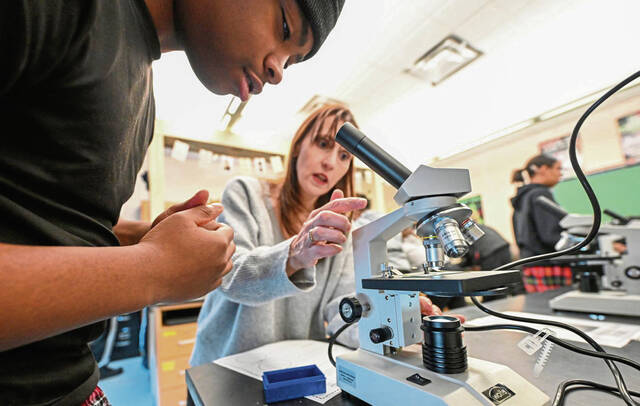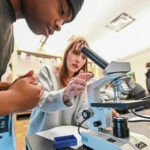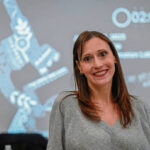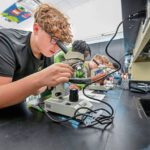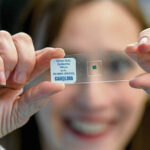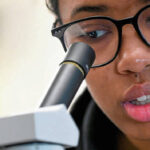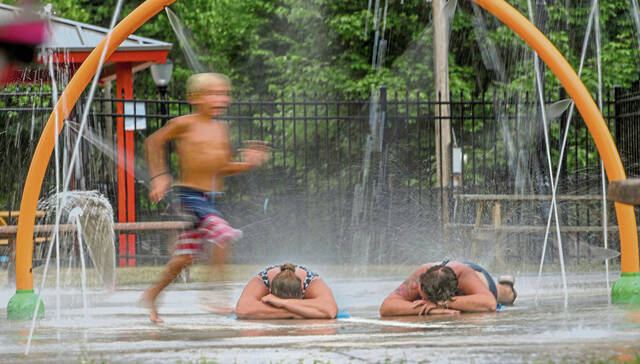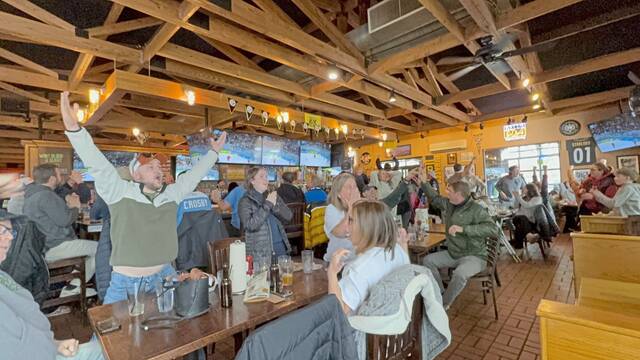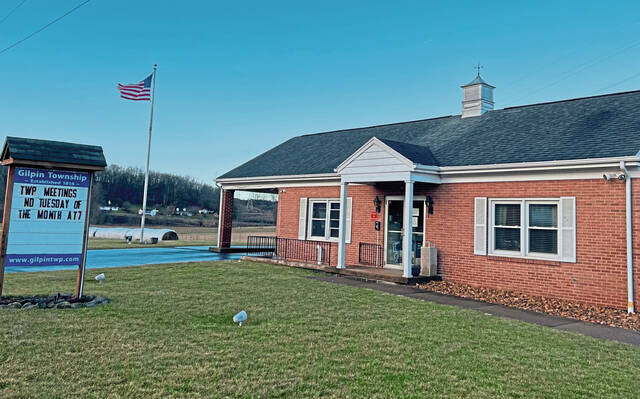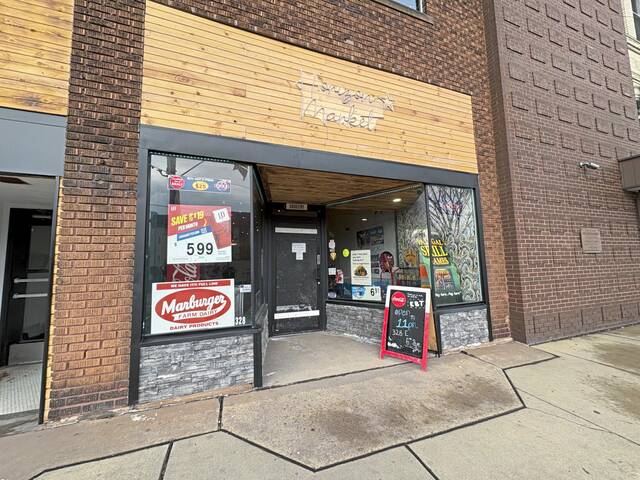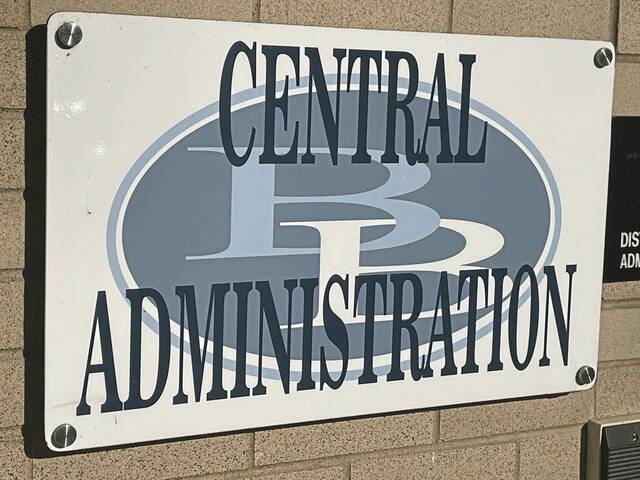Valley High School biology teacher Kathy Jo Sagwitz learned how to do more with less for her students.
“Before this year, I didn’t have a science room at all,” she said. “I was in a regular classroom with no lab area, no sink, no nothing. I was very limited in what I had and what I could do. I had to be very creative in the way that I taught science in order to give them lab experiences.”
Showing how she did that helped Sagwitz win a $20,000 science lab makeover package sponsored by Shell and administered by the National Science Teaching Association (NSTA).
The equipment Sagwitz got for her lab from Flinn Scientific included digital scales, thermometers and pH meters; microscope slides; models; an incubator for growing bacteria; a water distiller; and a demonstration cabinet.
Being able to do more labs and hands-on activities is invaluable for the students, Sagwitz said. It can spark an interest in science-related careers, which she said are in high demand and growing.
“We now have enough microscopes for each student to have individual microscopes,” she said. “We have enough slides for each of them to be able to work independently and view the slides, which really saves a lot of time and makes sure that each student is able to have access to that and not feel rushed.”
That’s good news for students who may be eyeing a career in science. Having hands-on experience with the kind of equipment now available to them could spark an interest in a lucrative career path.
Biochemists and biophysicists will be in high demand in the coming decade, according to the U.S. Bureau of Labor Statistics.
By 2033, the bureau estimates the demand for jobs in those fields will increase by 9%, with the nation needing an additional 3,100 such scientists each year. The same is true for traditional chemists, a field the bureau says will grow by at least 10% in the same time with 1,400 new jobs needing to be filled each year.
Driving the demand for those jobs are needs for the development of new drugs, ways to increase food production, the development of clean fuel technologies and the ever-growing field of environmental protection, according to the bureau.
The pay isn’t bad, either. The median salary for biochemists in 2023, the latest year for which numbers are available, was more than $107,000.
One of 24 regional winners across the nation near Shell facilities — in this case, Shell Polymers Monaca in Potter Township, Beaver County — the New Kensington-Arnold educator is now a finalist for a grand prize valued at an additional $5,000.
Winners of the grand prize will be selected by early February and able to attend the NSTA national conference in Philadelphia in March, association spokeswoman Kate Falk said.
High-quality labs provide hands-on experiences that turn theory into practice, sparking curiosity and creativity and encouraging students to explore and innovate, NSTA CEO Erika Shugart said.
“These experiences build critical thinking, problem-solving and technical skills, which are essential for success in college and STEM careers,” she said. “By working with modern equipment and conducting experiments, students gain a deeper understanding of science, boosting both their confidence and readiness for fields like engineering, technology and research.”
Sagwitz has taught at Valley for 17 years. She runs the science club and sponsors the quiz bowl team and the international travel club.
Through the science club, she recently took students to Allegheny General Hospital in Pittsburgh to view an open heart surgery. Last June, the travel club visited the Galapagos Islands.
This was the first time Sagwitz entered the Shell competition, encouraged by fellow biology teacher Kim Johnson, who was a regional winner in 2022. She got a lab makeover package valued at $15,000. The microscopes Sagwitz’s students use came from Johnson’s prize.
The prizes for the competition increased in value this year.
“I was blown away when I got the phone call and they told me I had won,” Sagwitz said.
To enter, science teachers were asked to describe their school’s current laboratory resources, explain why upgraded support is needed and describe their approach to science education instruction using their school’s current lab facilities. A panel of science educators reviewed and selected the top entries.
As part of her entry, Sagwitz designed an experiment in which students can extract DNA from strawberries using household items, such as rubbing alcohol. The idea was to show what can be done with limited resources on a low budget or without any advanced equipment.
“When you don’t have funds to be able to do unlimited labs and buy that equipment, it really makes you have to be creative in your lesson planning,” she said. “Making meaningful labs with limited resources can be really difficult.”
Valley Principal Jon Banko said Sagwitz has always looked to give her students more opportunities.
“It’s hard to do that when you’re just operating out of a textbook,” he said. “Kathy has gotten really good at finding those avenues for funding and resources. It’s exciting for her and the kids.”
For the grand prize, Sagwitz made a video showing how winning the regional prize has impacted her classroom.
“Winning the Shell Regional Science Lab Challenge helped us upgrade our classroom and turn our lab area into a modern, hands-on learning space. This learning environment now fosters curiosity and cultivates a greater appreciation for nature,” she said in the video.
The Shell prize was not the only thing that made things better for Sagwitz and her students. Her classroom was moved in a rearrangement of the building, getting her a room upgrade with a lecture space in the front and lab area in the back.
“It’s more enjoyable for them and for me,” she said. “It’s no fun for them to be sitting there working on a worksheet.”


